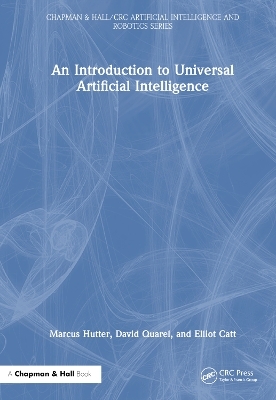
An Introduction to Universal Artificial Intelligence
Chapman & Hall/CRC (Verlag)
978-1-032-60715-3 (ISBN)
An Introduction to Universal Artificial Intelligence provides the formal underpinning of what it means for an agent to act intelligently in an unknown environment. First presented in Universal Algorithmic Intelligence (Hutter, 2000), UAI offers a framework in which virtually all AI problems can be formulated, and a theory of how to solve them. UAI unifies ideas from sequential decision theory, Bayesian inference, and algorithmic information theory to construct AIXI, an optimal reinforcement learning agent that learns to act optimally in unknown environments. AIXI is the theoretical gold standard for intelligent behavior.
The book covers both the theoretical and practical aspects of UAI. Bayesian updating can be done efficiently with context tree weighting, and planning can be approximated by sampling with Monte Carlo tree search. It provides algorithms for the reader to implement, and experimental results to compare against. These algorithms are used to approximate AIXI. The book ends with a philosophical discussion of Artificial General Intelligence: Can super-intelligent agents even be constructed? Is it inevitable that they will be constructed, and what are the potential consequences?
This text is suitable for late undergraduate students. It provides an extensive chapter to fill in the required mathematics, probability, information, and computability theory background.
Marcus Hutter is Senior Researcher at DeepMind in London and Professor in the Research School of Computer Science (RSCS) at the Australian National University (ANU) in Canberra, Australia (fulltime till 2019 and honorary since then). He is Chair of the ongoing Human Knowledge Compression Contest. He received a master’s degree in computer science in 1992 from the University of Technology in Munich, Germany, a PhD in theoretical particle physics in 1996, and completed his Habilitation in 2003. He worked as an active software developer for various companies in several areas for many years, before he commenced his academic career in 2000 at the Artificial Intelligence (AI) institute IDSIA in Lugano, Switzerland, where he stayed for six years. Since 2000, he has mainly worked on fundamental questions in AI resulting in over 200 peer-reviewed research publications and his book Universal Artificial Intelligence (Springer, EATCS, 2005). He has served (as PC member, chair, organizer) for numerous conferences, and reviews for major conferences and journals. He has given numerous invited lectures, and his work in AI and statistics was nominated for and received several awards (UAI, IJCAI-JAIR, AGI Kurzweil, Lindley). http://www.hutter1.net/ David Quarel is completing a PhD at the ANU. He holds a BSc in mathematics and MSc in computer science, specialising in artificial intelligence and machine learning. David has several years’ experience in developing course content and distilling complex topics suitable for a wide range of academic audiences, as well as having delivered guest lectures at the ANU, and spent two years as a full-time tutor before starting his PhD. Elliot Catt is a Research Scientist at DeepMind London and has previously completed a PhD in Universal Artificial Intelligence. He holds a BSc and MSc in mathematics and a PhD in computer science. Elliot has lectured on the topic of Advanced Artificial Intelligence at the ANU and published several pieces of work on the topic of Universal Artificial Intelligence. https://catt.id/
Part I: Introduction. 1. Introduction. 2. Background. Part II: Algorithmic Prediction. 3. Bayesian Sequence Prediction. 4. The Context Tree Weighting Algorithm. 5. Variations on CTW. Part III: A Family of Universal Agents. 6. Agency. 7. Universal Artificial Intelligence. 8. Optimality of Universal Agents. 9. Other Universal Agents. 10. Multi-agent Setting. Part IV: Approximating Universal Agents. 11. AIXI-MDP. 12. Monte-Carlo AIXI with Context Tree Weighting. 13. Computational Aspects. Part V: Alternative Approaches. 14. Feature Reinforcement Learning. Part VI: Safety and Discussion. 15. AGI Safety. 16. Philosophy of AI.
| Erscheinungsdatum | 30.05.2024 |
|---|---|
| Reihe/Serie | Chapman & Hall/CRC Artificial Intelligence and Robotics Series |
| Zusatzinfo | 6 Tables, black and white; 57 Line drawings, black and white; 6 Halftones, black and white; 63 Illustrations, black and white |
| Sprache | englisch |
| Maße | 178 x 254 mm |
| Gewicht | 1110 g |
| Themenwelt | Informatik ► Theorie / Studium ► Künstliche Intelligenz / Robotik |
| Technik ► Elektrotechnik / Energietechnik | |
| Technik ► Umwelttechnik / Biotechnologie | |
| ISBN-10 | 1-032-60715-7 / 1032607157 |
| ISBN-13 | 978-1-032-60715-3 / 9781032607153 |
| Zustand | Neuware |
| Haben Sie eine Frage zum Produkt? |
aus dem Bereich


